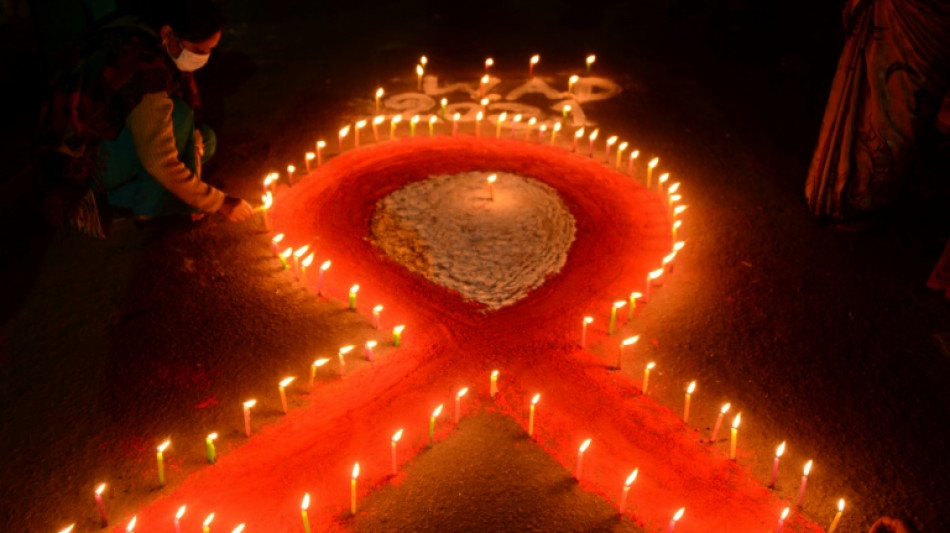
-
 World begins to welcome 2026 after a year of Trump, truces and turmoil
World begins to welcome 2026 after a year of Trump, truces and turmoil
-
Fofana reckons 'small details' restricting Chelsea's progress

-
 Israel to ban 37 aid groups operating in Gaza
Israel to ban 37 aid groups operating in Gaza
-
Filmmaker Panahi says Iran protests 'to move history forward'

-
 Xi says China to hit 2025 growth target of 'around 5 percent'
Xi says China to hit 2025 growth target of 'around 5 percent'
-
Turkey steps up anti-IS raids, arresting 125 suspects

-
 Arteta says Arsenal reaping rewards for 'sacrifices and commitment'
Arteta says Arsenal reaping rewards for 'sacrifices and commitment'
-
China says live-fire drills around Taiwan 'completed successfully'

-
 Nancy adamant he's still the man for Celtic job after Motherwell defeat
Nancy adamant he's still the man for Celtic job after Motherwell defeat
-
Hoping for better year ahead, Gazans bid farewell to 'nightmare' of 2025

-
 Queen Camilla recalls fighting back against train attacker
Queen Camilla recalls fighting back against train attacker
-
Stocks drop at end of record year for markets

-
 Amorim still 'really confident' about Man Utd potential despite Wolves draw
Amorim still 'really confident' about Man Utd potential despite Wolves draw
-
Berlin says decision postponed on European fighter jet

-
 Iran prosecutor pledges 'decisive' response if protests destabilise country
Iran prosecutor pledges 'decisive' response if protests destabilise country
-
Emery defends failure to shake hands with Arteta after Villa loss to Arsenal

-
 China says to impose extra 55% tariffs on some beef imports
China says to impose extra 55% tariffs on some beef imports
-
Japanese women MPs want more seats, the porcelain kind

-
 Guinea junta chief Doumbouya elected president: election commission
Guinea junta chief Doumbouya elected president: election commission
-
Pistons pound Lakers as James marks 41st birthday with loss

-
 Taiwan coastguard says Chinese ships 'withdrawing' after drills
Taiwan coastguard says Chinese ships 'withdrawing' after drills
-
France's homeless wrap up to survive at freezing year's end

-
 Leftist Mamdani to take over as New York mayor under Trump shadow
Leftist Mamdani to take over as New York mayor under Trump shadow
-
French duo stripped of Sydney-Hobart race overall win

-
 Thailand releases 18 Cambodian soldiers held since July
Thailand releases 18 Cambodian soldiers held since July
-
Tiny tech, big AI power: what are 2-nanometre chips?

-
 Libyans savour shared heritage at reopened national museum
Libyans savour shared heritage at reopened national museum
-
Asia markets mixed in final day of 2025 trading

-
 Global 'fragmentation' fuelling world's crises: UN refugee chief
Global 'fragmentation' fuelling world's crises: UN refugee chief
-
Difficult dance: Cambodian tradition under threat

-
 Regional temperature records broken across the world in 2025
Regional temperature records broken across the world in 2025
-
'Sincaraz' set to dominate as 2026 tennis season kicks off

-
 Bulgaria readies to adopt the euro, nearly 20 years after joining EU
Bulgaria readies to adopt the euro, nearly 20 years after joining EU
-
Trump v 'Obamacare': US health costs set to soar for millions in 2026

-
 Isiah Whitlock Jr., 'The Wire' actor, dies at 71
Isiah Whitlock Jr., 'The Wire' actor, dies at 71
-
SoftBank lifts OpenAI stake to 11% with $41bln investment

-
 Bangladesh mourns ex-PM Khaleda Zia with state funeral
Bangladesh mourns ex-PM Khaleda Zia with state funeral
-
TSMC says started mass production of 'most advanced' 2nm chips

-
 Australian cricket great Damien Martyn 'in induced coma'
Australian cricket great Damien Martyn 'in induced coma'
-
Guinea junta chief Doumboya elected president: election commission

-
 Capstone Extends Revolving Credit Facility with Berkshire Bank, Strengthening Liquidity and Financial Flexibility
Capstone Extends Revolving Credit Facility with Berkshire Bank, Strengthening Liquidity and Financial Flexibility
-
Laser Photonics Regains Nasdaq Compliance for Quarterly Filing Requirement

-
 CEO Letter to Aclara Shareholders: 2025 Accomplishments and 2026 Outlook
CEO Letter to Aclara Shareholders: 2025 Accomplishments and 2026 Outlook
-
Apex Provides Recap of 2025 Regional Exploration Drilling and Priority Follow Up Targets at the Cap Critical Minerals Project

-
 Guardian Metal Resources PLC Announces Total Voting Rights
Guardian Metal Resources PLC Announces Total Voting Rights
-
Caballero defends Maresca after Palmer substitution sparks jeers

-
 Depleted Man Utd 'lack quality', says Amorim
Depleted Man Utd 'lack quality', says Amorim
-
'We know what we want': Arteta eyes title after Arsenal thrash Villa

-
 Arsenal crush Villa to make statement in title race
Arsenal crush Villa to make statement in title race
-
Senegal top AFCON group ahead of DR Congo as Tanzania make history


'Lucky to still be alive': Living with HIV for over 30 years
When people were diagnosed with HIV more than three decades ago, it was considered a death sentence.
But after suffering through discrimination, the loss of loved ones and brutal side effects from drugs, advances in treatment over the years have allowed millions to live with the virus.
To mark the 40th anniversary of the discovery of the virus that causes AIDS, AFP spoke to four long-term survivors about their experience.
- 'Stigma' remains -
Paul Kidd, a 59-year-old activist and lawyer who lives north of the Australian city of Melbourne, said he was first diagnosed with HIV in 1991 but had probably already had it for several years.
Although he asked for a test in 1986, he said his doctor advised against it because "at that time there were no treatments and the political climate was very bad for people with HIV, with open calls for us to be quarantined, criminalised or otherwise mistreated".
"My diagnosis was hard to accept but not really a surprise, as an ex-partner of mine had died of AIDS in 1988," he said.
"Many people I knew and loved died."
After his diagnosis, Kidd started on an antiretroviral drug called AZT, which he said "made me very sick" but which he credits with saving his life.
Now he takes just one daily pill with no side effects.
"One thing that hasn't changed much is HIV stigma," he said, particularly in some regions.
"Uganda and Ghana are going in a terrible direction, and people with HIV in Russia and Eastern Europe have a much harder life than I ever did," he said.
"I know I am lucky to still be alive and the volunteer work I do is my way of honouring the memory of those who aren't with us any more."
- 'A little miracle' -
Pascale Lassus, a 62-year-old retiree in the southwestern French city of Bayonne, said she unknowingly contracted HIV in 1984 from her then boyfriend.
She did not find out until a decade later, when she was tested after falling ill with bronchitis.
"I was stunned," she said.
"I had been living normally until then and my immune system went haywire."
Then her six-year-old daughter tested positive.
"The doctor told me she wouldn't make it through adolescence. I was totally devastated."
The only treatment available was AZT, which had "horrific" side effects, she said.
"I had to wake my daughter up at night because it had to be taken every four hours."
But a new three-drug regimen in 1995 changed things.
"Today, my daughter is 35 years old," she said.
"She was able to have a child who is HIV-negative -- a little miracle."
- 'An asterisk at best' -
Grissel Granados, a 36-year-old deputy director of a women-focused non-profit organisation, has had HIV all her life.
When she was born in Mexico in 1986, her mother required an emergency Caesarean section, contracting HIV during a blood transfusion.
Her mother then "unknowingly breastfed me and that's how I acquired HIV", said Granados, who now lives in Los Angeles.
It wasn't until five years later, "when my dad started getting sick" that the family learned it had HIV, she said.
Her father died shortly after being diagnosed. Her mother was pregnant at the time but was advised not to breastfeed.
"So my sister, thankfully, is HIV-negative," Granados said.
Despite getting cancer at the age of 10, Granados said she "has had a very healthy life".
But she feels that people who have had HIV since birth are too often forgotten or ignored.
"We're an asterisk at best. For the most part, we are not represented in the history of long HIV," she said.
- 'Discriminated against' -
Joel Vermont, a 58-year-old living in the eastern suburbs of Paris, found out he had HIV in 1992.
"I was 27. It felt like being hit by a falling building," he said.
When he started on AZT, the "abominable" side effects led to him losing nearly 30 kilograms (65 pounds).
Then the new three-drug regimen "didn't work on me".
"I switched to alcohol," he said.
"My viral load exploded. I developed lung disease and early-onset cancer.
"I ended up in hospital, where I was in a coma for 45 days. When I woke up, I couldn't walk and I was paralysed in one arm."
After being "discriminated against" at work, he spent eight years on sick leave before winning a court case.
"For years, I heard I was going to die. Then all of a sudden I was told that I had to live," he said.
"I needed psychological support to accept that."
M.Thompson--AMWN



